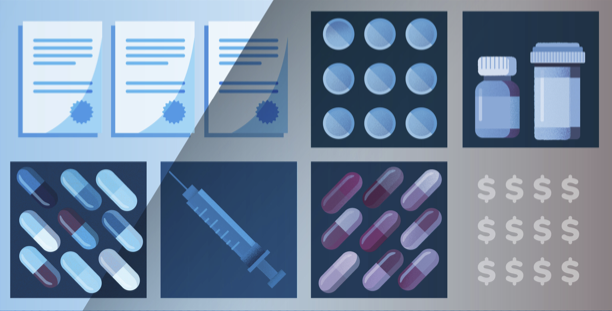There’s been one common theme at the forefront of the pharmaceutical industry’s recent attacks on Medicare’s ability to negotiate drug prices: these efforts to lower drug prices for seniors will crush drugmakers’ ability to innovate.
The fact that the Congressional Budget Office analysis that accompanied the law showed it would result in just one fewer drug approval over the next decade has not stopped industry protests about the need to defend “innovation”. The CEO of PhRMA, the drug industry lobbying group, claimed “you can’t take hundreds of billions of dollars out of the pharmaceutical industry and not expect that it’s going to have a real impact on the industry’s ability to develop new treatments and cures.” In lockstep, Johnson & Johnson’s suit to stop the “innovation-damaging congressional overreach” mentions “innovation” 31 times.
This innovation argument is one that I-MAK is very familiar with, as it is the main fearmongering tactic the industry relies on whenever there is an attempt to address its manipulation of the U.S. patent system and its anti-competitive pricing tactics. Setting aside the fact that “innovation” as the industry uses it is often an empty word deployed to justify patents on small tweaks to pre-existing drugs, there are a growing number of accounts that the patent system’s flawed incentives can have negative effects for patients and on the development of genuinely new inventions.
A recent New York Times investigation into Gilead’s product hopping of H.I.V. treatments showed how our current patent system incentivizes companies to prioritize extending their patent protection on an existing drug over delivering patients the benefits of a modified version. Here, Gilead knowingly delayed developing a modified version of an existing H.I.V. drug with a better side effect profile in order to extend its hold of the market, and now faces a suit from 26,000 patients who claim they were unnecessarily exposed to kidney and bone problems. Prep4All’s James Krellenstein told the Times, “This is what happens when a company intentionally delays the development of an H.I.V. drug for monopolistic purposes.”
There’s even acknowledgement from within the industry’s own ranks of how the patent system can stunt real, meaningful invention. A recent Life Science Leader article about I-MAK’s work quotes Jeremy Levin, Chairman and CEO at Ovid Therapeutics and former BIO Board Chair, as saying that “protecting old drugs through incremental patents is not the way to stimulate innovation.”
As the attacks against Medicare’s ability to negotiate intensify, and as the relief negotiations would bring to millions of seniors is seriously jeopardized, we need to keep challenging this “innovation” refrain wherever we see it. Setting a higher standard for patents is one of I-MAK’s core proposals for patent reform. Whether it’s in Medicare negotiation or patent reform, we should be fighting for policies that encourage the creation of real inventions and ensure they are widely available to the people who need them.
What we’re doing
Last Wednesday, Senator Peter Welch (D-VT) held up a chart from our Overpatented, Overpriced: 2022 investigation to demonstrate how AbbVie’s extended patent protection allowed it to sharply raise the price on its blockbuster drug Humira. The senator then asked USPTO Director Kathi Vidal what the agency can do to stop drugmakers from abusing the patent system.
Protect Our Care hosted a press conference to highlight findings from their new report on the impact Medicare negotiations will have on lowering drug prices and curbing patent abuse. I joined Protect Our Care Advocates, The Alliance for Retired Americans, and Senator Welch and explained how a large share of drug spending is driven by a small amount of brand-name, patent protected drugs including the ones likely to be selected for Medicare negotiation.
In other federal drug pricing action, earlier this month I-MAK joined Patients for Affordable Drugs Now and the AARP in a joint letter urging Senate action to lower drug prices. We also partnered with Public Citizen on a letter to Senator Chuck Schumer calling on him to include insulin reforms in anticipated drug pricing legislation. These efforts are important steps in the ongoing mission to curb patent abuse and lower drug prices.
There is a global need for more equitable patent policy. I recently took part in a panel with South Centre — an intergovernmental organization of developing countries — to discuss the importance of good pharmaceutical patent examination standards for promoting access to medicines.
Journalists at More Perfect Union published a video investigation explaining how diabetes and weight loss drugs like Mounjaro and Ozempic are poised to become the next wave of expensive blockbuster drugs patients will struggle to afford. I broke down the strategies these companies will likely employ to extend patent protection on these future blockbuster drugs.
Relevant news rundown
We’ve highlighted much of the relevant domestic medicines access news already in this newsletter, but there is one update of global importance that I want to call out here.
Earlier this month, negotiators met in Geneva to discuss a new WHO treaty to better prepare for future pandemics but emerged with a resolution that keeps the status quo intact. Covid-19 showed us that voluntary measures are an inadequate mechanism to equitably scale up medicines production and save lives. The proposed treaty text on IP, driven by industry and the Global North, ignores that lesson.
Looking forward
I was heartened to see this video by the popular author John Green explaining Johnson & Johnson’s patenting strategies to delay generic competition on its tuberculosis drug, bedaquiline. Explainers like this help people understand how companies are manipulating patents to prolong their monopolies around the world. It behooves us all to realize patent reform is not one country’s fight, but all of ours.
